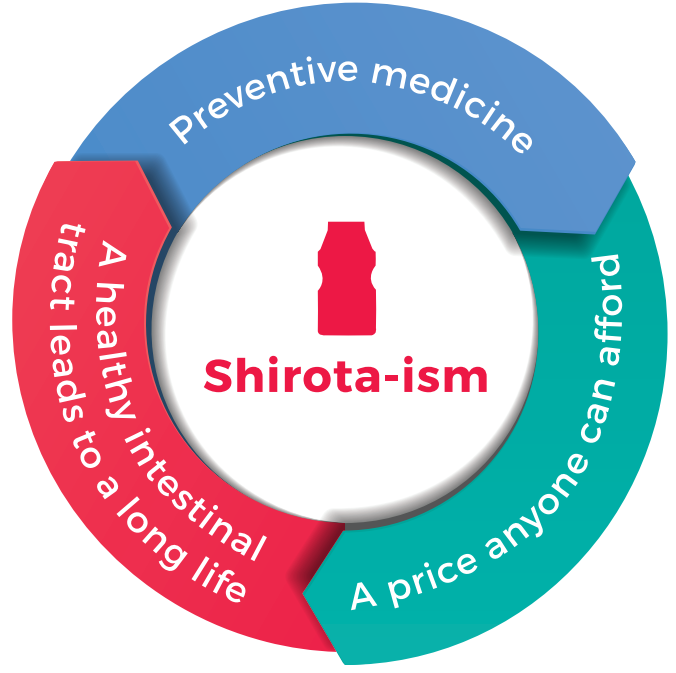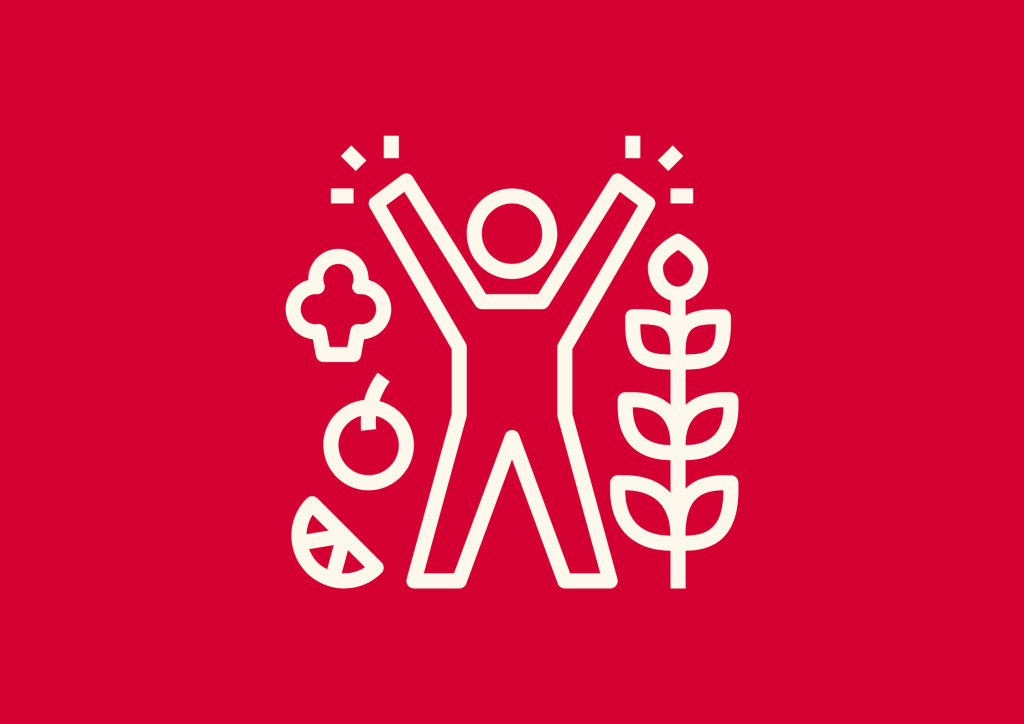What is Preventative Medicine?
Preventive medicine is a medical specialty focused on preventing disease, prolonging life, and promoting health and well-being through proactive measures, rather than treating illness after it occurs.
Health can be defined as “a state of complete physical, mental, and social well-being, and not merely the absence of disease or infirmity” (1, 2).
Why Dr. Shirota Believed in Preventative Medicine
Minoru Shirota, M.D., Ph.D. began his medical studies in 1921 at Kyoto Imperial University (now Kyoto University). At the time, Japan had yet to achieve economic prosperity, and unsanitary conditions caused large numbers of children to die of infectious diseases. In 1930, he succeeded in strengthening and culturing a strain of lactic acid bacteria that could reach the intestines alive and produce beneficial effects. This strain is now known as Lacticaseibacillus paracasei Shirota (LcS) strain, after Dr. Shirota himself, which helps suppress harmful bacteria and increase the number of beneficial bacteria in the intestines.
Dr. Shirota, together with volunteers, then developed an inexpensive, flavourful beverage, so that as many people as possible could benefit from the positive effects of Lacticaseibacillus paracasei Shirota (LcS) strain. That is how the fermented milk drink Yakult was born in 1935. Today, millions of people around the world enjoy Yakult for its health benefits. Dr. Shirota’s belief in the importance of intestinal health and preventing illness rather than just treating it became a core principle of Yakult’s philosophy, known as Shirota-ism. (3) Learn more about the daily benefits of Yakult on our website!

Preventative medicine today is implemented on a national scale through government health promotion initiatives, however, proactive measures to support health can also be practised on an individual level too!
Tips for supporting your health!
1. Move your Body Regularly
Regular physical activity offers numerous health benefits, including improved overall wellbeing, better brain health (4) and reduced risk of noncommunicable diseases, depression, and anxiety. Adults are encouraged to be active most days, as every bit of movement contributes to long-term health. (5) According to Australia’s Physical Activity and Sedentary Behaviour Guidelines, adults should aim for 2.5–5 hours of moderate activity and 1.25–2.5 hours of vigorous activity each week, along with muscle-strengthening exercises at least twice weekly. (5)
2. Managing life’s stresses
Growing evidence suggests that stress can contribute to physical illnesses such as high blood pressure, increased susceptibility to infections, and chronic fatigue. (6) One way to counteract the negative effects of stress is by boosting endorphin levels, commonly known as the feel-good hormones, which can be increased through simple lifestyle changes. (7) Since stress can be difficult to manage, incorporating techniques like regular exercise, seeking help, meditating, eating a balanced diet, getting enough sleep, and making time to enjoy life can help improve wellbeing and naturally enhance endorphin production. (6)
3. Regularly including prebiotic foods in your diet
Prebiotics are specific types of indigestible fibre (8) that support gut health by promoting the growth of beneficial bacteria in the large intestine. Prebiotic-rich foods include wholegrain bread, oats, artichoke, garlic, onion, chickpeas, lentils, pomegranate, cashews, pistachios, and dates. Alongside prebiotics, maintaining a healthy, balanced, and varied diet, rich in fruits, vegetables, whole grains, lean proteins, and dairy, can help prevent lifestyle-related diseases (9). Eating a wide range of colourful fruits and vegetables provides antioxidants and phytonutrients, which support immune function and protect against illness (10). It is also important to limit ultra-processed foods, which are often high in sugar, salt, and saturated fats and have been linked to poor heart and mental health (11). Examples include chips, sweets, soft drinks, and processed meats. Swapping these for healthier options like popcorn, dark chocolate, water, and freshly cooked lean meats is recommended.
4. Consider consuming probiotics daily
Probiotics are beneficial, healthy bacteria that support overall wellbeing. Different probiotic strains offer different health benefits, as no two species or strains are the same. (12) For a product to be considered a true probiotic, it must contain live microorganisms, a well-characterised and identified bacterial strain, be clinically proven to provide a health benefit at the given amount and remain viable throughout its shelf life. (13,14) Probiotics are commonly found in foods such as Yakult, yoghurt, kombucha, kimchi, and sauerkraut. To confirm a product contains probiotics, check the nutrition panel for live viable organisms, often listed as colony forming units (CFUs). For example, Yakult contains the Lacticaseibacillus paracasei Shirota (LcS) strain, which research has shown can alter and increase the number of beneficial bacteria in the intestines and encourage regular bowel movements by improving stool consistency when consumed daily. (15)
Overall, there are many simple daily habits we can adopt to support our health. These include increasing physical activity, managing stress, enjoying Yakult regularly, and maintaining a healthy, balanced, and varied diet that is low in ultra-processed foods. Together, these practical steps can contribute to better health and well-being.
References
- Australian Institute of Health and Welfare. What is health? Updated June 17, 2024. Accessed July 30, 2025. https://www.aihw.gov.au/reports/australias-health/what-is-health
- World Health Organization. Constitution of the World Health Organization. Accessed July 30, 2025. https://www.who.int/about/governance/constitution
- Yakult Australia. Our story: Yakult history and timeline. Accessed July 30, 2025. https://www.yakult.com.au/our-story/yakult-history-and-timeline/
- World Health Organization. Physical activity. Updated June 26, 2024. Accessed July 30, 2025. https://www.who.int/news-room/fact-sheets/detail/physical-activity
- Australian Government Department of Health. Physical activity and exercise guidelines for all Australians: For adults 18 to 64 years. Updated May 10, 2021. Accessed July 30, 2025. https://www.health.gov.au/topics/physical-activity-and-exercise/physical-activity-and-exercise-guidelines-for-all-australians/for-adults-18-to-64-years
- Better Health Channel. Stress and physical illness. Updated Oct 18, 2020. Accessed July 30, 2025. https://www.betterhealth.vic.gov.au/health/healthyliving/stress#stress-and-physical-illness
- Harvard Health Publishing. Feel-good hormones: How they affect your mind, mood and body. Accessed July 30, 2025. https://www.health.harvard.edu/mind-and-mood/feel-good-hormones-how-they-affect-your-mind-mood-and-body
- Davani-Davari D, Negahdaripour M, Karimzadeh I, Seifan M, Mohkam M, Masoumi SJ, Berenjian A, Ghasemi Y. Prebiotics: Definition, Types, Sources, Mechanisms, and Clinical Applications. Foods. 2019;8(3):92. doi: 10.3390/foods8030092.
- Carlson JL, Erickson JM, Lloyd BB, Slavin JL. Health Effects and Sources of Prebiotic Dietary Fiber. Curr Dev Nutr. 2018;2(3):nzy005. doi: 10.1093/cdn/nzy005.
- Minich DM. A Review of the Science of Colorful, Plant-Based Food and Practical Strategies for “Eating the Rainbow”. J Nutr Metab. 2019 ;2019:2125070. doi: 10.1155/2019/2125070.
- Health direct Australia. Ultra-processed foods: What are they and which ones should I avoid? Updated July 8, 2024. Accessed July 30, 2025. https://www.healthdirect.gov.au/blog/ultra-processed-foods-what-are-they-and-which-ones-should-i-avoid
- Minocha A. Probiotics for preventive health. Nutr Clin Pract. 2009 ;24(2):227-41. doi: 10.1177/0884533608331177.
- International Scientific Association for Probiotics and Prebiotics (ISAPP). Resources for clinicians: Probiotics. Updated October 2022. Accessed July 30, 2025. https://isappscience.org/for-clinicians/resources/probiotics/#toggle-id-1
- Hill C, Guarner F, Reid G, Gibson GR, Merenstein DJ, Pot B, et al. The International Scientific Association for Probiotics and Prebiotics consensus statement on the scope and appropriate use of the term probiotic. Nat Rev Gastroenterol Hepatol. 2014;11;506-514. https://www.nature.com/articles/nrgastro.2014.66
- Yakult Australia. Benefits – Yakult Australia. Accessed July 30, 2025. https://www.yakult.com.au/our-story/yakult-benefits/
